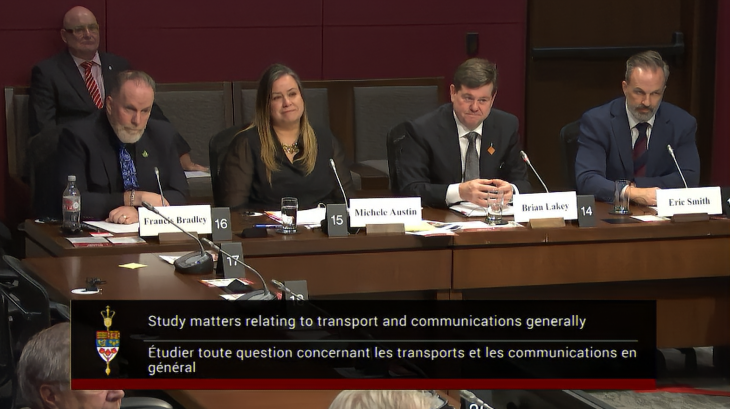
By Ahmad Hathout
Representatives from the country’s largest telcos urged Senate members to consider legislation that would make copper theft a serious crime to deter what they say is becoming an increasing problem as the value of the element rises.
Currently, the criminal code penalizes copper theft as “theft under $5,000,” which the telecoms say does not align with the significance of the impact of that crime and doesn’t match what other jurisdictions have been doing – which is to charge the matter more severely.
Over the first two days of hearings on copper theft on Tuesday and Wednesday, members of the Senate Transportation and Communications committee heard the need for amendments to the Criminal Code to more harshly penalize such theft and to force scrap metal dealers to record all such sales for access by law enforcement. Some senators even wondered whether federal law should hold the buyers more accountable for the rise in such theft, which has increased because copper is increasingly being used in power grids and electric vehicle peripherals, among other things.
Eric Smith, senior vice president of the Canadian Telecommunications Association (CTA), a trade group representing large telecoms, said Wednesday the incidents of copper theft and vandalism has risen 200 per cent between 2022 and the beginning of 2024, which has affected telecommunications services to Canadians across the country.
He agreed with senator recommendations that some onus be placed on scrap metal buyers, and recommended that businesses be forced to collect the seller’s identification, not allow them to accept cash because that would not leave a paper trail, and to have them hold onto the copper until law enforcement checks it out.
“Copper theft is responsible for 88 per cent of the physical and security incidents that impact Bell’s network,” Michele Austin, Bell’s vice president of public affairs, told the committee on Wednesday. “The year-over-year increase of copper theft from November 2023 to November 2024 was 78 per cent.”
Austin said Bell has spent millions of dollars on security, including installing aerial alarms, and has filed lawsuits against the thieves of the wire used to power services to its customers.
Austin said there should be amendments to the Criminal Code that create specific offenses that target networks, telecommunications facilities, and services.
Foreign interference Bill C-70, which was enacted into law this summer, expands the scope of “sabotage offence to include certain acts done in relation to essential infrastructures,” but requires multiple elements of proof, including intent to harm national interests, which is hard to show in copper theft, witnesses said.
Brian Lakey, vice president of the Reliability Centre of Excellence at Telus, said the telco recommends two legislative approaches to the issue: amend the Criminal Code to classify any willful damage to critical infrastructure as a serious crime and amend the Telecommunications Act to prohibit and impose fines on the sale of illegally obtained telecommunications material.
The latter will “disrupt the supply chain for stolen copper by eliminating viable paths to market. This will compliment provincial regulations, creating a comprehensive framework to combat copper theft to across all jurisdictions.”
“Canada needs a dedicated metal taskforce, including coordinated investigations across law enforcement and improve interjurisdictional information sharing,” Lakey added.
He also said there must be a collaborative system where government, industry and law enforcement work together to tackle the issue.
The day before, on Tuesday, the Senate committee hosted Industry Canada, the Justice Department and the RCMP to discuss current and future efforts to address the issue.
While Industry Canada said it has awareness campaigns to help regular Canadians spot the theft in real-time to report them to Crimestoppers, the RCMP said it is working with industry and provinces to increase reporting on the matter and to reinforce infrastructure to protect against the theft.
While telecoms are decommissioning copper in favour of fibre optic cables, they say that process is very slow. And even if the transition is complete in some areas, the thieves don’t necessarily know the difference, Lakey conveyed. He gave an example of an incident in Quebec where someone came to steal copper, but got a handful of fibre optic cable instead, which was of no use to them. In other words, there needs to be stronger deterrence.
Francis Bradley, president and CEO of trade group Electricity Canada, said the federal government can regulate the scrap metal industry by requiring records of the sellers and ensure that the penalties align with the severity of the theft.
The CTA earlier this year called on the federal government to amend the Criminal Code to include harsher penalties for acts of vandalism or theft of critical telecom network equipment. The call for increased penalties has also come from a technical working group known as the Canadian Telecommunications Network Resiliency Working Group, which includes the major telecoms, who last year also called for subsidizing certain infrastructure in areas with little coverage and expanding the CRTC’s authority over municipal infrastructure.
Smith gave examples of other jurisdictions doing it right. He said tracing sellers of scrap metal helped the United Kingdom cut that theft by around 50 per cent. Records accessible to law enforcement following those sales have knocked that theft off by around 40 per cent in Australia. And in California – where the state has been cracking down on said theft – stealing of copper materials worth more than $950 could be classified as a felony, punishable by up to $10,000 in fees and up to three years in state prison.
Minnesota’s copper theft law, which comes into effect on January 1, requires sellers to have a $250 license. Scrap metal businesses are suing the state because they say the law will put them out of business.
Screenshot of witness panel on Wednesday


